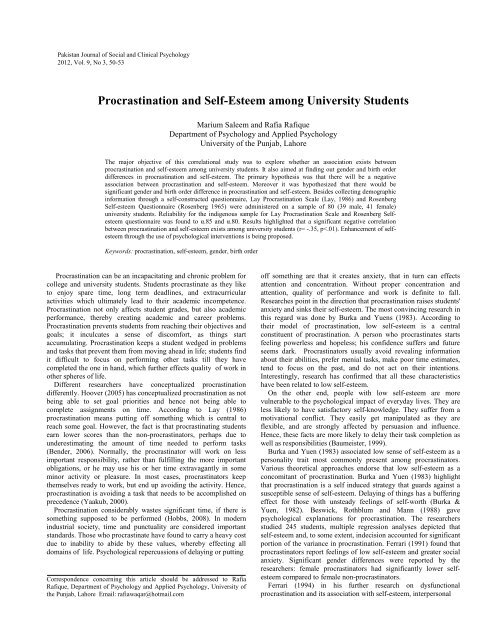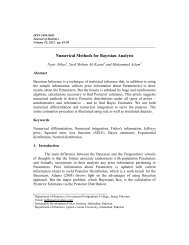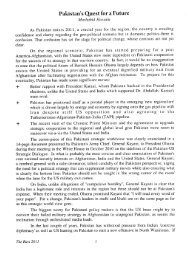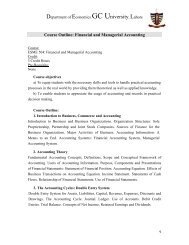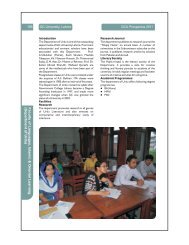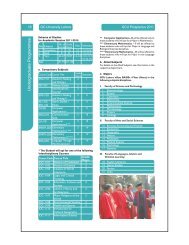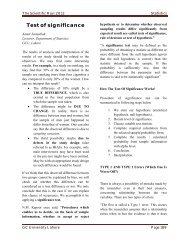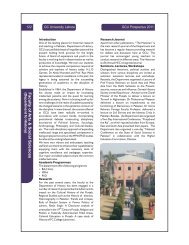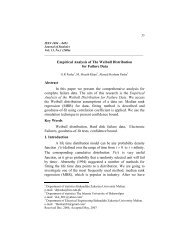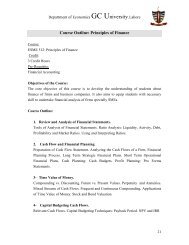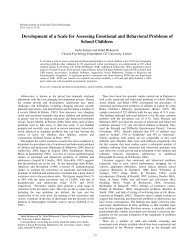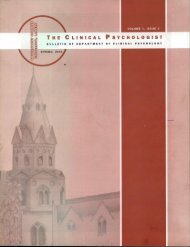Full Text PDF - Government College University
Full Text PDF - Government College University
Full Text PDF - Government College University
You also want an ePaper? Increase the reach of your titles
YUMPU automatically turns print PDFs into web optimized ePapers that Google loves.
Pakistan Journal of Social and Clinical Psychology<br />
2012, Vol. 9, No 3, 50-53<br />
Procrastination and Self-Esteem among <strong>University</strong> Students<br />
Marium Saleem and Rafia Rafique<br />
Department of Psychology and Applied Psychology<br />
<strong>University</strong> of the Punjab, Lahore<br />
The major objective of this correlational study was to explore whether an association exists between<br />
procrastination and self-esteem among university students. It also aimed at finding out gender and birth order<br />
differences in procrastination and self-esteem. The primary hypothesis was that there will be a negative<br />
association between procrastination and self-esteem. Moreover it was hypothesized that there would be<br />
significant gender and birth order difference in procrastination and self-esteem. Besides collecting demographic<br />
information through a self-constructed questionnaire, Lay Procrastination Scale (Lay, 1986) and Rosenberg<br />
Self-esteem Questionnaire (Rosenberg 1965) were administered on a sample of 80 (39 male, 41 female)<br />
university students. Reliability for the indigenous sample for Lay Procrastination Scale and Rosenberg Selfesteem<br />
questionnaire was found to α.85 and α.80. Results highlighted that a significant negative correlation<br />
between procrastination and self-esteem exists among university students (r= -.35, p
dependency, and self-defeating behaviors. He found that low selfesteem,<br />
dependency and self-defeating acts were significantly<br />
associated with procrastination in young adults.<br />
An important research conducted by Lay (1986) revealed<br />
procrastinators’ behavior. Lay found that procrastination was found<br />
to be associated with disorganization. Moreover no significant<br />
association was found between procrastination with needachievement,<br />
level of energy and self-esteem. Lay (1987) found that<br />
procrastinators were high on the neurotic disorganization scale and<br />
also on the rebelliousness scale and had personal projects which,<br />
overall, were characterized by high stress, high difficulty, low<br />
progress, and low self-esteem. Gender differences were found as far<br />
as low self-esteem is concerned.<br />
Solomon and Rothblum (1984) in their research endorsed that<br />
academic procrastination is not only a deficit in study habits or time<br />
management skills, and involved an overall complex interplay of<br />
behavioral, cognitive, and affective components. However<br />
procrastination was found to be significantly related to feelings of<br />
low self-esteem.<br />
Ferrari and Emmons (1995) concluded that procrastinators have<br />
low self-esteem and delay task completion because they believe<br />
they lack the ability to achieve task success. People suffering from<br />
inferiority complex may believe that any failure to perform up to<br />
the mark inculcates overall feelings of inadequacy in an individual.<br />
In order to protect ones self-esteem and people may self-handicap<br />
by procrastinating in order to give an external reason for their delay.<br />
(Steel, 2007a) Baumeister (1999) on the other hand, observed that<br />
people with high self-esteem know more about themselves; this<br />
knowledge is more stable over time and less marred by internal<br />
contradictions. They are high in motivation and procrastinate less.<br />
The present study is an attempt to explore the relationship between<br />
procrastination and self-esteem among students.<br />
Research findings from present study will help in identifying<br />
whether procrastination and self-esteem are related as far as student<br />
population is concerned. Once a relationship is highlighted, our<br />
research can lay grounds for designing psychological intervention<br />
strategies which can facilitate in raising self-esteem. Raising<br />
students’ self-esteem can act as a cure for their habit of<br />
procrastination. Proper and timely intervention to enhance selfesteem<br />
can ultimately lead to better academic outcomes for<br />
students; that can be beneficial for laying grounds for a more<br />
productive future.<br />
Research Hypotheses<br />
There is significant association between procrastination and selfesteem<br />
in university students.<br />
There will be gender difference in level of procrastination among<br />
university students.<br />
There will be gender difference in self-esteem among university<br />
students.<br />
There will be difference in procrastination across birth order in<br />
university students.<br />
There will be difference in self-esteem across birth order in<br />
university students.<br />
Research design<br />
Method<br />
The current research investigated the relationship between procr-<br />
SALEEM AND RAFIQUE 51<br />
astination and self-esteem among university students. Correlational<br />
research design was used to identify the relationship between<br />
procrastination and self-esteem.<br />
Sample<br />
Multistage sampling was employed in this research, randomly<br />
name of four universities were selected amongst the list of public<br />
and private sector universities in Lahore. Three departments among<br />
these four universities were randomly selected later on.<br />
A total of 80 students (39 males and 41 females) enrolled in<br />
bachelors and masters’ program between the ages 0f 18 to 25years<br />
were recruited from these three departments.<br />
Tools / Instruments for data collection<br />
1. General Procrastination scale: Procrastination was assessed<br />
as the score on the measure of Procrastination scale authored by<br />
(Lay, 1986). It is self-reported five point Likert scale (Extremely<br />
uncharacteristic= 1, moderately uncharacteristic= 2, Neutral=3,<br />
Moderately uncharacteristic =4 and Extremely uncharacteristic= 5).<br />
It comprises of 20 statements. 10 items are reversed-keyed items:<br />
(3, 4,6,8,11,13,14,15,18, and 20). Total score on this measure<br />
ranges between 20-100. The scale had high reliability. Cronbach's<br />
alpha for the local study sample was reported to be α .85. Score was<br />
computed by summing the ratings allocated to all the items, after<br />
reverse coding of the 10 items that were positively worded. Higher<br />
score revealed greater use of procrastination by the students.<br />
2. Rosenberg Self-esteem scale: Rosenberg Self-Esteem Scale<br />
(Rosenberg, 1965) was used to assess self-esteem. It comprises of<br />
10 statements. Research participants responded to all10 statements<br />
on a Likert scale, ranging from strongly agree, agree, disagree and<br />
strongly disagree. Scores for items 1, 2, 4, 6, and 7 were computed<br />
by assigning 3 to strongly agree category, 2 to agree, 1 to disagree<br />
and 0 to strongly disagree. For Items 3, 5, 8, 9, and 10 are reversely<br />
scored (Cronbach's alpha reliability of α .80 was found for the<br />
indigenous sample.<br />
Procedure<br />
Permission letters to conduct this research were sought from the<br />
universities. Later, authority letters were presented to chairpersons<br />
/directors of the departments from these universities for formal<br />
consent to initiate data collection. Written consent was taken from<br />
each and every participant who volunteered to participate in this<br />
study. Confidentiality procedures were explained verbally to the<br />
participants as well as mentioned in the consent form. Purpose of<br />
the research was clearly spelled out in the written consent form.<br />
Demographic form was constructed to collect demographic<br />
information from these participants regarding their age, gender,<br />
birth order, department and students’ academic status. After filling<br />
in the demographic information were asked to complete the General<br />
Procrastination Scale and Rosenberg Self-esteem Scale. English<br />
versions of both these scales were used. Later both of these<br />
questionnaires were quantitatively configured and scores were<br />
obtained . Results were generated through the application of SPPS<br />
(version 17).<br />
Results<br />
A sample of 80 government and private university students was
Table 1.<br />
Descriptive characteristics of the Study Sample. (N=80)<br />
Demographic<br />
Variables f %<br />
Gender<br />
Male 39 48.8%<br />
Female 41 51.3%<br />
Education level<br />
Bachelors 42 52.5%<br />
Masters 38 47.5%<br />
Birth order<br />
First born 22 27.5%<br />
Middle born 44 55.0%<br />
Last born 12 15.0%<br />
Only child 2 2.5%<br />
Mean Age range in years= 21<br />
Region<br />
Lahore 71 88.8%<br />
Out of Lahore 9 11.3%<br />
Family system<br />
Joint 33 41.3%<br />
Nuclear 47 51.8%<br />
Note. Percentage = %<br />
Table 2.<br />
Relationship between Procrastination and Self-Esteem.<br />
Variable N r p<br />
Procrastination<br />
80 -.35 .001<br />
Self-Esteem<br />
** Correlation is significant at the 0.001 level (2-tailed).<br />
taken for this research project. The demographic characteristics of<br />
the sample are given in Table 1. Descriptive statistics were<br />
calculated.<br />
Pearson correlation addressed the relationship between<br />
procrastination (M =58.6, SD =10.1) and self-esteem score (M<br />
=26.1, SD =6.97). For an alpha level of .01, the correlation between<br />
self-esteem and procrastination was found to be statistically<br />
significant, r = -.35, p < .01.<br />
Discussion<br />
The main objective of this study was to explore association<br />
between procrastination and self-esteem in students studying in<br />
universities. Statistically significant negative correlation was found<br />
between procrastination and self-esteem. Researches done<br />
previously by different group of researchers ( Ferrari, 1991; Ferrari,<br />
1994; Harrington, 2005; Lay, 1986; Lay, 1987; Beswick, Solomon<br />
and Mann, 1988; Steel, 2007b) have also found comparable results.<br />
The study revealed no difference between male and female<br />
students on procrastination. Though the difference was not<br />
statistically significant, but procrastination did exist in both groups.<br />
These research findings are consistent with that of Effert and Ferrari<br />
(1989). These researchers were also unable to find significant<br />
gender differences on procrastination.<br />
Similarly, no statistically significant gender difference on selfesteem<br />
was found. This research finding is consistent with that of<br />
Maria and Yolanda (2003). These researchers examined the<br />
relationship of self-esteem with regard to gender and age for 660<br />
PROCRASTINATION AND SELF-ESTEEM 52<br />
Spanish students. Results endorsed no significant gender differences<br />
in general self-esteem.<br />
Moreover our study findings highlight that difference on<br />
procrastination for first, second, middle born and the only child<br />
were statistically non-significant. These findings are consistent with<br />
that of Adams (1998). He designed a study to infer if there was<br />
significant difference between the birth order and the level of<br />
procrastination, and found no difference in level of procrastination<br />
across birth order.<br />
Results of the study also failed to reach statistical significance for<br />
self-esteem and birth order, revealing that there is no difference in<br />
self-esteem across birth order. These research findings are<br />
consistent with that of research conducted by David and Estela<br />
(1980); these researchers also failed to find any difference in selfesteem<br />
and position one is born with.<br />
So it can be concluded that students with high self-esteem<br />
procrastinate less where as those who procrastinate more have<br />
comparatively lower self-esteem. Procrastination and self-esteem do<br />
not differ for male and female university students. Furthermore, the<br />
present study points that procrastination and self-esteem remain<br />
same and is not difference across birth order, meaning that first<br />
born, middle born, last born and only child do not differ with regard<br />
to self-esteem and procrastination.<br />
Limitations<br />
The present study has a small sample size hence limited<br />
generalizability and in order that more valid and reliable conclusion<br />
could be drawn, the study needs to be replicated with a larger<br />
sample size.<br />
It would be better to include other variables like anxiety, selfefficacy,<br />
perfectionism and depression to know about their<br />
correlates of procrastination.<br />
A number of implications have emerged from the results of the<br />
present study. Due to procrastination, students lose their precious<br />
time as well as quality of work. It can lower their self-esteem, as<br />
they start feeling bad at the end of the day when they fail to do<br />
anything productive. Research results point in the direction of<br />
therapeutic intervention for students who procrastinate. Suggestions<br />
can be given for enhancement of self-esteem. Improving selfesteem<br />
is a better way to cure procrastination in students. Selfappraisal<br />
and self-worth leads students to do their tasks<br />
scrupulously and make important decisions on time. Timely<br />
intervention can help students improve their skills like time<br />
management and study habits.<br />
Psychological interventions designed for enhancement of selfesteem<br />
and time management need to be incorporated within the<br />
academic structure of colleges and universities. Student counseling<br />
and assessment centers should be set up in the universities for<br />
timely help of students who have low self-esteem or for those in the<br />
habit of procrastination.<br />
References<br />
Adams, L. (1998). The Effects of Birth order on Procrastination.<br />
Retrieved from http://clearinghouse.missouriwestern.edu/<br />
manuscripts/14.asp<br />
Baumeister, R.F. (1999). The Self in Social Psychology<br />
.Philadelphia, USA: Edwards Brother, Ann Arbor.<br />
Bender, S.L. (2006). Procrastination can be good for us. Retrieved<br />
from http://www.sharonbender.com/procrastination.html
Beswick, G., Rothblum, E. D., & Mann, L. (1988). Psychological<br />
antecedents of student Procrastination. Australian<br />
Psychologist, 23, 207–217.<br />
Burka, J. B., & Yuen, L. M. (1982). Mind games procrastinators<br />
play. Psychologist Journal, 7, 32-34.<br />
Burka, J. B., & Yuen, L. M. (1983). Procrastination: Why you do it,<br />
what to do about it. Reading, MA: Addison-Wesley.<br />
David, W., & Estela, A. (1980). Birth Order, Family Size, and Self-<br />
Esteem: A Filipino Study. Journal of Genetic Psychology, 137,<br />
297-98.<br />
Effert, B. R., & Ferrari, J. R. (1989). Decisional procrastination:<br />
Examining personality Correlation. Journal of Social Behavior<br />
and Personality, 4, 151-156.<br />
Ferrari, J. R. (1991). Self-handicapping by procrastinators:<br />
Protecting self-esteem,Social-esteem, or both. Journal of<br />
Research in Personality ,25, 245-261.<br />
Ferrari, J. R. (1994). Dysfunctional procrastination and its<br />
relationship with self-esteem, Interpersonal dependency and<br />
self-defeating behaviors. Journal of Personality and Individual<br />
Differences, 17,673-679.<br />
Ferrari, J.R., & Emmons, R.A. (1995). Methods of procrastination<br />
and their relation To self-control and self-reinforcement: An<br />
exploratory study. Journal of Social Behavior and Personality,<br />
10, 135-142.<br />
Harrington, N (2005). It’s too difficult! Frustration intolerance<br />
beliefs and procrastination Personality and Individual<br />
Differences, 39, 873-883.<br />
Hobbs, J. (2008). What Are The Major Disadvantages of<br />
Procrastination? Retrieved from<br />
http://ezinearticles.com/?What-Are-The-Major-Disadvantagesof-Procrastination?<br />
&id=1087177<br />
SALEEM AND RAFIQUE 53<br />
Hoover, E. (2005). The chronicle of higher education: Tomorrow, I<br />
Love Ya! Retrieved from<br />
http://chronicle.com/free/v52/i16/16a03001.htm<br />
Lay, C. H. (1986). At last, my research article on procrastination.<br />
Journal of Research in Personality, 20, 474-495.<br />
Lay, C. H. (1987). A modal profile analysis of procrastinators: A<br />
search for types. Journal of Personality and Individual<br />
Differences, 8, 705-714.<br />
Maria, L.F., & Yolanda, R.C. (2003). Age and sex differences in<br />
self-esteem among Spanish adolescents. Psychological reports,<br />
93,876-878.<br />
Steel, P. (January 01, 2007a). The nature of procrastination: a metaanalytic<br />
and theoretical review of quintessential self-regulatory<br />
failure. Psychological Bulletin, 133, 1, 65-94.<br />
Steel, Piers. (2007b). The nature of procrastination. American<br />
Psychological Association (APA.<br />
Yaakub, F. N. (2000). Procrastination among Students in Institutes<br />
of Higher Learning: Challenges for K-Economy.<br />
Received January, 2009<br />
Revision Received May, 2012


